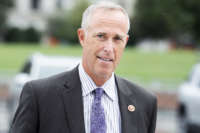
Sen. Elizabeth Warren (D-Massachusetts) and Rep. Pramila Jayapal (D-Washington) are demanding information on “corrupt schemes” to pad accounting firms’ profits involving the Treasury Department, the Internal Revenue Service (IRS) and other government agencies.
The lawmakers have sent letters to five top accounting firms asking them to detail their revolving door relationships with the government. The request comes after a September New York Times report exposing how staff and executives at accounting firms like PwC take jobs within the Treasury Department and other agencies to help write tax codes that will benefit their former companies — and then return to those companies with raises or promotions.
The New York Times uncovered 35 examples of this practice during the last four presidential administrations, calling it a “remarkably effective behind-the-scenes system to promote [accounting firms’] interests in Washington.” Even veterans of the accounting industry admit that the revolving door is a major reason why the wealthy are able to benefit from and exploit the U.S. tax code.
“Accounting giants are abusing the public trust and taking advantage of the revolving door between public service and private profit,” Jayapal and Warren wrote in letters to Deloitte, PwC, EY, KPMG and RSM.
The lawmakers continued by citing Warren’s Anti-Corruption and Public Integrity Act. “Americans are sick and tired of these corrupt schemes,” they went on. “The decades-long scam in which large accounting firms have abused the revolving door between the government and the private sector to help their wealthy clients avoid paying their fair share of taxes demonstrates precisely why this legislation is necessary.”
The Anti-Corruption and Public Integrity Act would draw stricter lines between the private and public sector. It bars private companies from immediately hiring people who have just left a government position, and prohibits them from incentivizing executives to enter the public sector by giving them large compensation packages, or so-called “golden parachutes.” The bill would also establish a separate government office to monitor ethics and corruption within the government.
The lawmakers then asked the companies to disclose if, since 2001, they have had employees take positions within the Treasury Department, the Internal Revenue Service (IRS) or elsewhere in the government, and then return to the company afterward. They also requested details of that employment, including what positions they took, their clients and their compensation over time.
In at least 16 of the cases that the New York Times uncovered in September, the former government officials were promoted to partner and rewarded with double their salaries when they returned to their private sector firms.
The lawmakers drew a direct line between the revolving door practices and the tax code. “Massive accounting firms have spent decades unethically abusing the revolving door between government and the private sector to help wealthy clients avoid paying their fair share of taxes. It’s corruption,” wrote Jayapal on Twitter.
“The unethical revolving door of personnel between [the Treasury Department] and the biggest accounting firms has to end,” said Warren. “Americans should trust that our policies work for them, not the richest corporations.”
A report by the Institute on Taxation and Economic Policy earlier this year found that 55 large corporations, including FedEx, Nike and American Electric Power, paid $0 in federal income taxes in 2020. In fact, the effective tax rate was in the negatives for many of these companies, partially thanks to the 2017 tax cuts implemented by former President Donald Trump and the GOP.
Recent plans to tax corporations by lawmakers like Warren have been met with the cold shoulder by conservatives in Congress, however. Many of them — like Sen. Kyrsten Sinema (D-Arizona) — enjoy close relationships with deep-pocketed lobbyists. And despite the fact that major accounting firms like Deloitte and PwC have a revolving door relationship with the government, which skews tax policy in their favor, they still spend hundreds of thousands or even millions of dollars on lobbying.
This post was originally published on Latest – Truthout.




























